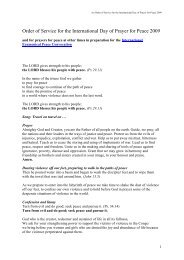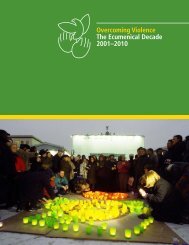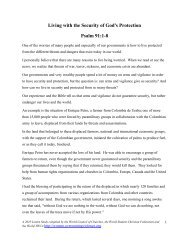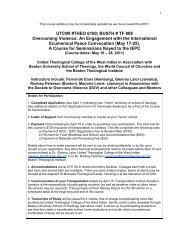Alternative Globalization Addressing Peoples and Earth
Alternative Globalization Addressing Peoples and Earth
Alternative Globalization Addressing Peoples and Earth
Create successful ePaper yourself
Turn your PDF publications into a flip-book with our unique Google optimized e-Paper software.
livelihoods<br />
• Churches, congregations <strong>and</strong> service organizations are called to align<br />
their economic management <strong>and</strong> investment structures with the<br />
principles of an AGAPE economy.<br />
• Churches are encouraged to build alliances with social movements<br />
<strong>and</strong> trade unions that advocate for decent jobs <strong>and</strong> just wages.<br />
• Work for programmes that encourage participatory budget processes<br />
where they become subjects of their own resource allocation for self<br />
development.<br />
• To support alternative ethical financing of small entrepreneurs, farmers,<br />
Indigenous <strong>Peoples</strong>, women, youth <strong>and</strong> people with disabilities.<br />
• To support <strong>and</strong> develop economies of solidarity by drawing lessons<br />
from the solidarity economy initiatives <strong>and</strong> networks, public policies<br />
that foster an economy of solidarity, the economy of communion, the<br />
practice of the Focolare movement, developing further the El Escorial<br />
guidelines of sharing resources, <strong>and</strong> the Russian Orthodox church<br />
initiative of developing a code of moral principles <strong>and</strong> rules of economic<br />
activity.<br />
• Churches are encouraged to engage in efforts of regional ecumenical<br />
organizations <strong>and</strong> world communions to develop alternative<br />
economies, such as the efforts of the Pacific churches on the “Isl<strong>and</strong><br />
of Hope” concept.<br />
• Encourage churches to be engaged in inter-faith cooperation in the<br />
search <strong>and</strong> work for alternatives such as the “economics of enough” as<br />
a challenge to the economies of greed <strong>and</strong> competition.<br />
• Support initiatives promoting adequate social services <strong>and</strong> access to<br />
medical care in particular in the fight against HIV/AIDS.<br />
• Encourage churches to advocate for education for all, particularly for<br />
women <strong>and</strong> youth.<br />
6.4.2. Trade<br />
• Churches need to advocate the shift from fair trade to just trade.<br />
• Churches should establish the practice of using fair trade products as<br />
a minimum.<br />
• At the global level, churches should join the trade for people campaign.<br />
• Churches are expected to contribute to the re-negotiations of<br />
entitlements under multilateral trade agreements, <strong>and</strong> should<br />
collaborate closely with social movements in making those agreements<br />
just, equitable <strong>and</strong> democratic.<br />
57











